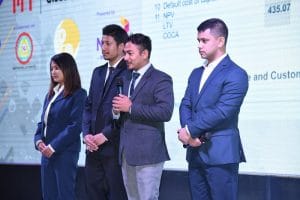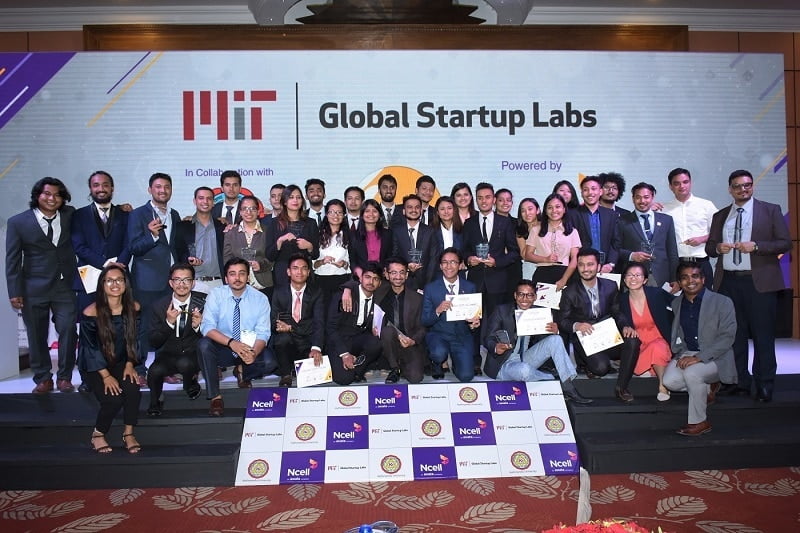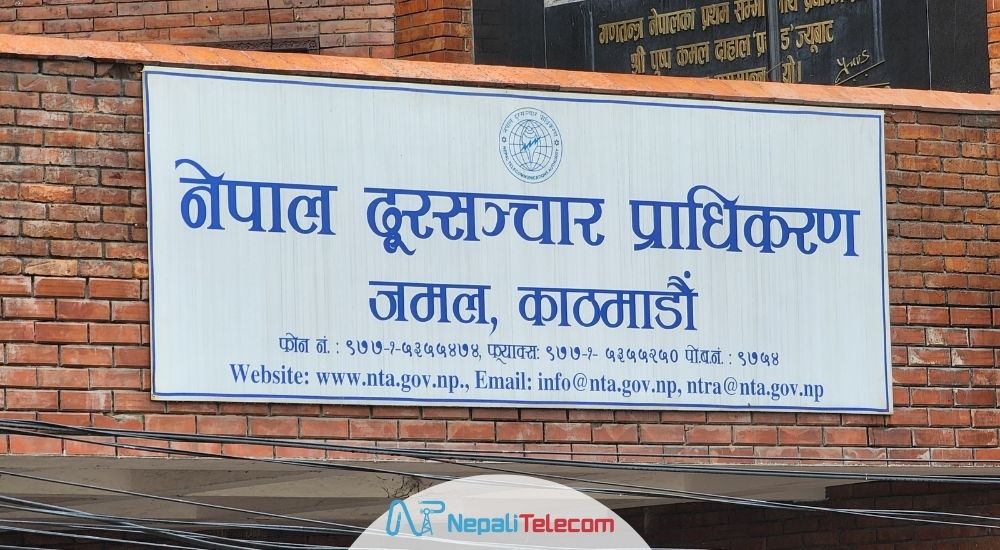MIT Global Startup Labs in collaboration with Kathmandu University powered by Ncell produced nine prospective startup teams of Nepali students who at the end of a seven weeklong intense innovation boot camp pitched their ideas and business plans to a panel of judges on Thursday (August 2). The Demo Day was organized to provide the students with an opportunity to showcase their innovations, demonstrate public speaking, and inspire startup culture in Nepal.
The Demo Day brought to the center stage leading-edge startup ideas and their working prototypes, which have high potential to address the way Nepalis are served in health, education, tourism, and professional services. The prototypes showcased on the day reflected on the training that students underwent during the MIT GSL program.
The Demo Day was also attended by numerous entrepreneurs, business leaders, academic officials, and potential investors.
MIT GSL was conducted for the first time in Nepal by MIT in collaboration of Kathmandu University (KU) and Ncell, with 35 students from KU who formed 9 teams and worked on their respective startup idea. The teams were supported by 4 MIT instructors.
The participating students were chosen from among 150 students and alumni of KU. The panel of judges at the Demo Day comprised of Atulya Pandey (COO and Co-founder of Pagevamp.com), Aayushi K.C. (Founder and CEO of Khalisisi), Nikita Acharya (Co-founder and CEO of Urban Girl, UG Cakes, and UG Chocolates), and Himal Karmacharya (Founder and President of Leapfrog Technology).
Karmacharya, one of the judges and MIT Alum 2001, shares, “It has always been a dream to have MIT involved in Nepal. I am excited about all the startup ideas and the teams. They came very far in the 7 weeks of the MIT program. As I was judging, I saw the clear impact of the 24 steps of the disciplined entrepreneurship developed at MIT. The next step really is to promote cross-learning by having MIT interns in Nepal.”
Keynote speaker, Sumana Shrestha, MIT alumni MBA 2013, entrepreneur and founder of Bhuntu who also runs a private management consulting firm inspired the audience.
Sajilo Marmat Sewa wins
The best three start-up ideas chosen by the panel of judges were Sajilo Marmat Sewa followed by Kinder and Opus. Each of the three teams has been awarded an opportunity to participate in the Micro Master Course (MMC) online course of MIT and also received a seed fund of Rs 500,000, Rs 300,000 and Rs 200,000 respectively from Ncell. Likewise, they have also been rewarded with space and mentorship facility at Kathmandu University School of Management (KUSOM) Incubation Center. Members of other teams have also been awarded an opportunity to receive a certificate course from MIT EdX.
The MIT has been conducting MIT GSL program for the last 18 years in 25 countries promoting economic development by cultivating young technology entrepreneurs, including India and Sri Lanka in South Asia. The program has been empowering technology entrepreneurs and helping to cultivate the startup ecosystem in emerging economies.

MIT Professor Jeffrey S. Ravel, Head of History and Faculty Lead of the MIT-Nepal Initiative said, “I think there have been tremendous benefits for Nepali participants and educational growth for our MIT students. I hope they have had a rich educational experience along with a dynamic business introduction through the MIT style of hands-on learning. I think it has been a wonderful way for our MIT community to engage with the local ecosystem in Nepal and we have learned as much as our students. It is my hope that the energy and goodwill generated over the past few months will lead to continued collaborations between MIT, KU, and Ncell. I look forward to future outcomes and building strong ongoing partnerships. We want to thank our alumni support, KU faculty, and all of Ncell.”
Four MIT instructors – Sisam Bhandari, Hem Narayan Das Chaudhary, Suresh Rajan, and Jackie Xu – supported the participants with an aim to introduce the MIT style of learning in Nepal through hands-on learning, an interdisciplinary curriculum of technology and entrepreneurship, and 24/7 commitment to pursuing one’s dream.
Jackie Xu, lead technical instructor of MIT GSL Nepal 2018 and MIT Masters of Computer Science and Engineering 2018 graduate said, “We have been amazed by our students’ hard work, dedication, and passion over these past 7 weeks to polish their business pitches and perfect their tech MVPs. No matter the outcome of Demo Day, our students have the skills and grit to continue their work from our program and build the future of Nepal.”
Addressing the audience, Dr. Hans Wijayasuriya, Regional CEO, South Asia of Axiata Group Bhd said, “Youth are backbone, nourishment, and energy behind Digital Nepal. MIT GSL has happened in Nepal at the time of the 4th industrial revolution, where opportunities exist for all to build on accessibility created by the mobile device and innovate across sectors like agriculture, health, and education, and contribute to the elimination of social divide and create equality, wealth and inclusive society.”
Ncell MD words
Suren J. Amarasekera, Managing Director of Ncell said, “MIT GSL program has been a phenomenal journey for all involved. They say we always wanted to do it and do it with the best partners. We are thankful to MIT and KU for this collaboration. We believe the MIT style of learning and developing a company have inspired talented Nepali youth and hope they will use this experience to revolutionize the Nepali digital ecosystem and even make a global impact.”
Dr. Ram Kantha Makaju Shrestha, Vice Chancellor of KU said, “KU always believed in knowledge visibility. Events like this create memories and everything follows them. Congratulation to the dear youth of Nepal.”













